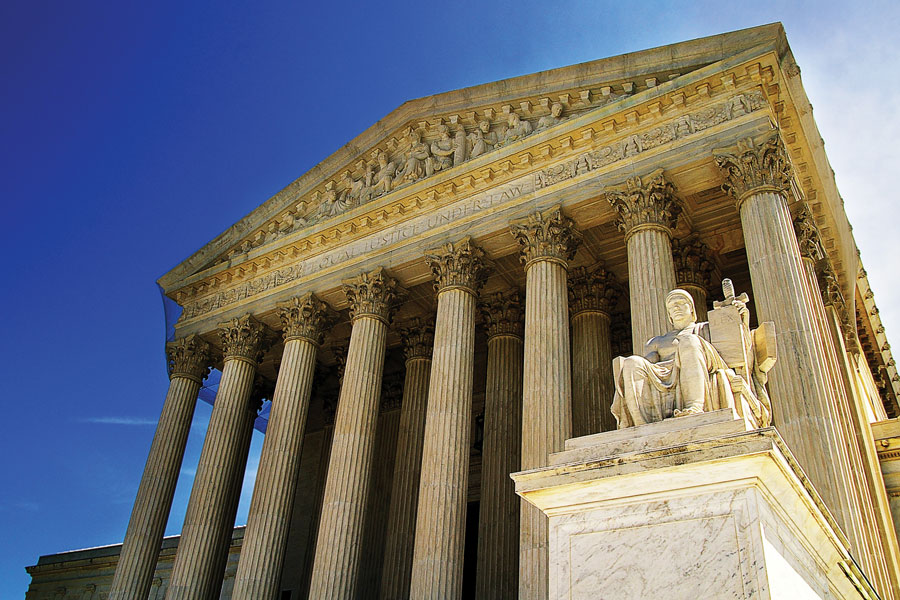

Next week the Supreme Court will hear a case that could determine how much legal weight to give a financial firm’s statements about putting customers first.
The high court has scheduled a oral argument next Monday in a case that involves an investment in Goldman Sachs stock by the Arkansas Teacher Retirement System and other pension plans and individual investors. The investors — who bought Goldman shares between February 2007 and June 2010 — allege the price of the stock was influenced by Goldman’s claims that it avoided conflicts of interest.
The plaintiffs allege that Goldman knew of conflicts surrounding the sales of collateralized debt obligations made up of subprime mortgages.
In 2010, Goldman reached a $550 million settlement with the Securities and Exchange Commission — the largest SEC penalty paid by a Wall Street firm at the time — over its failure to disclose the role that a hedge fund that shorted a CDO played in the selection of the mortgages in its portfolio.
In 2011, the plaintiffs brought their suit against Goldman, claiming that its assertions about being conflict-free artificially boosted its stock price, which took a hit after Goldman admitted CDO sales conflicts.
A district court certified the class action by the shareholders, but Goldman appealed the decision. The Court of Appeals for the 2nd Circuit vacated the class designation, sending the case back to the district court. The lower court redid its assessment of class status and granted it again. The appeals court affirmed the class designation last April.
Goldman appealed the 2nd Circuit’s ruling to the Supreme Court, which will wrestle with questions about how class certifications can be challenged and how far plaintiffs need to go to prove their case at the class-certification stage.
In its decision, the 2nd Circuit quoted Goldman regarding its business practices, including: “We have extensive procedures and controls that are designed to identify and address conflicts of interest. Our clients’ interests always come first.”
But Goldman argues that its statements were generic and aspirational and did not materially impact its stock price.
“Future plaintiffs seeking class certification need only identify a drop in a company’s stock price following the disclosure of alleged misconduct, then assert that the stock price had been improperly maintained by boilerplate aspirational statements that nearly all companies make,” Goldman said in its petition for Supreme Court review of the case. “That result is deeply troubling given the reality that securities class actions are routinely filed after drops in stock price and nearly all of them settle following class certification.”
In an amicus brief, the Securities Industry and Financial Markets Association said a ruling in favor of the plaintiffs would open the flood gates to class-action suits.
“If left to stand, the [2nd Circuit] decision threatens to … burden companies and their shareholders with meritless claims based on generic statements which have no price impact,” the brief states.
Investor advocates warn that what is at stake in the case is whether investors will be able to bring lawsuits against financial firms for false or misleading claims.
“If the Supreme Court rules [in favor of Goldman], it will destroy your ability to have confidence in the statements made by management and in the information that you have to have to make informed business and investment decisions,” Lynn Turner, former chief accountant at the Securities and Exchange Commission, told reporters on a conference call last Thursday.
“The SEC’s enforcement abilities would take a huge, huge hit,” he added.
Barbara Roper, director of investor protection at the Consumer Federation of America, said the case has implications for Regulation Best Interest, the SEC’s broker advice standard.
“If statements that we always put our customers first, if statements that we have strong controls in place to address conflicts of interest are just generic, are just puffery, then the entire foundation of Regulation Best Interest is generic and puffery,” Roper said on the media conference call. “I think that would mean the SEC essentially would have to go back and completely rewrite those rules.”
With the confirmation last fall of Justice Amy Coney Barrett, the Supreme Court now has a 6-3 conservative majority. Roper declined to predict how the court might rule.
“I’m not going to pretend this is an easy slam dunk,” she said. “If we thought that, we probably wouldn’t [have held a media briefing]. But I do think that the fundamental principles here aren’t ones that should be controversial in a sane world.”

Relationships are key to our business but advisors are often slow to engage in specific activities designed to foster them.

Whichever path you go down, act now while you're still in control.

Pro-bitcoin professionals, however, say the cryptocurrency has ushered in change.

“LPL has evolved significantly over the last decade and still wants to scale up,” says one industry executive.

Survey findings from the Nationwide Retirement Institute offers pearls of planning wisdom from 60- to 65-year-olds, as well as insights into concerns.
Streamline your outreach with Aidentified's AI-driven solutions
This season’s market volatility: Positioning for rate relief, income growth and the AI rebound
